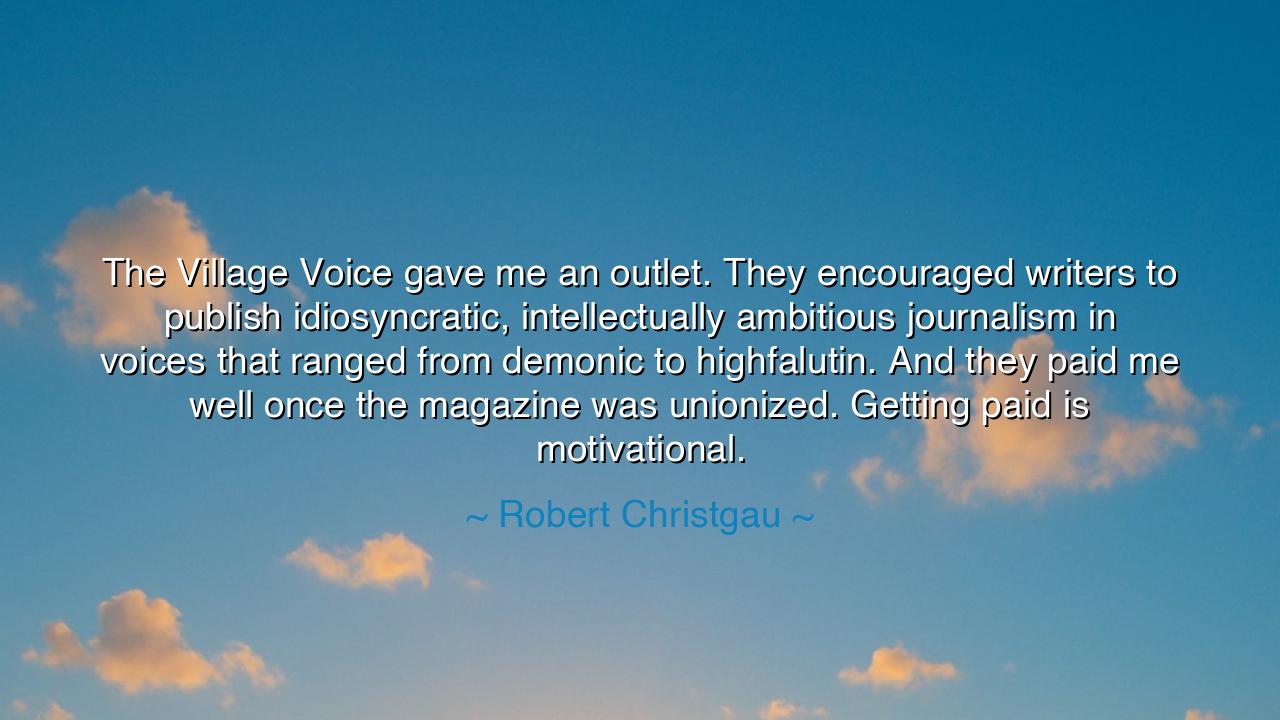
The Village Voice gave me an outlet. They encouraged writers to
The Village Voice gave me an outlet. They encouraged writers to publish idiosyncratic, intellectually ambitious journalism in voices that ranged from demonic to highfalutin. And they paid me well once the magazine was unionized. Getting paid is motivational.






Hear the words of Robert Christgau, elder of letters, who speaks not only of writing but of the very soul of labor: “The Village Voice gave me an outlet. They encouraged writers to publish idiosyncratic, intellectually ambitious journalism in voices that ranged from demonic to highfalutin. And they paid me well once the magazine was unionized. Getting paid is motivational.” This saying, though it begins in the world of journalism, touches upon eternal truths: the need for freedom of voice, the value of work, and the dignity of just reward.
At the heart of his declaration lies the idea of an outlet—a place where creativity, thought, and individuality may pour forth unchained. The Village Voice, that storied paper of New York, became such a haven. There, writers were not asked to conform, to shrink their voices to the narrow lanes of convention. Instead, they were encouraged to be idiosyncratic, to be bold, to range from the wild and demonic to the lofty and highfalutin. Such freedom is rare in any age, for the powerful often seek uniformity. But where voices are allowed to flourish, truth and art blossom together.
Yet Christgau also names another eternal truth: compensation dignifies labor. For no matter how passionate a worker may be, the soul grows weary if effort is not honored with reward. When the Village Voice became unionized, and wages were given in fairness, Christgau felt his labor transformed. His words, once a gift, became also a livelihood. And thus he reminds us that getting paid is motivational—not merely because of money itself, but because payment is recognition, a sign that society values the work of the mind as much as the work of the hand.
This lesson echoes through history. Consider the Renaissance, when patrons like the Medicis supported artists and writers. Michelangelo’s genius would not have carved the Pietà had not his labor been sustained with patronage. Dante’s poetry might have withered had not communities honored the worth of his words. To pay a thinker, an artist, or a journalist is not to cheapen their craft—it is to ensure that their gift endures. For when work is valued, the worker is emboldened to create, to strive, to reach higher.
There is also, hidden within Christgau’s words, the ancient theme of justice through union. For he did not say he was paid fairly from the beginning—he said it came once the magazine was unionized. This is the story of countless workers across centuries who, alone, had no power, but together, raised their voices and demanded fairness. From the guilds of medieval Europe to the labor strikes of the Industrial Revolution, unity has always been the path by which dignity is secured. Christgau, by naming this, ties his own story to the long march of workers who refused to let their efforts be dismissed.
The lesson is thus twofold: creativity requires freedom, and freedom requires fairness. A society that silences its voices grows barren. A society that refuses to honor its workers grows unstable. But when voices are freed to speak, and when workers are paid in justice, a culture flourishes. Journalism becomes bold, art becomes daring, and truth becomes alive. Christgau’s gratitude to the Village Voice is not merely personal—it is the gratitude of anyone who has ever been given both the freedom to speak and the dignity of being valued.
What, then, must we do? Cherish outlets where originality thrives. Support spaces that allow idiosyncratic voices to be heard. Defend the right of workers to be compensated fairly, for in that fairness lies motivation, and in motivation lies excellence. And in your own life, whether you lead or follow, never forget: to recognize the labor of others is to nurture their spirit, and to nurture their spirit is to strengthen the world.
Thus, let Christgau’s words be carried forward: an outlet for voice, and fairness in labor—these are the seeds of motivation. Where they are planted, society grows vibrant. Where they are denied, society grows hollow. Let us choose always to honor the worker, to protect the voice, and to ensure that truth, art, and justice remain bound together as the pillars of human dignity.






AAdministratorAdministrator
Welcome, honored guests. Please leave a comment, we will respond soon